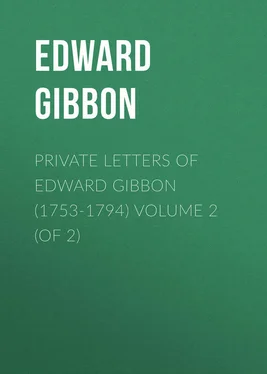Edward Gibbon - Private Letters of Edward Gibbon (1753-1794) Volume 2 (of 2)
Здесь есть возможность читать онлайн «Edward Gibbon - Private Letters of Edward Gibbon (1753-1794) Volume 2 (of 2)» — ознакомительный отрывок электронной книги совершенно бесплатно, а после прочтения отрывка купить полную версию. В некоторых случаях можно слушать аудио, скачать через торрент в формате fb2 и присутствует краткое содержание. Жанр: foreign_antique, foreign_prose, на английском языке. Описание произведения, (предисловие) а так же отзывы посетителей доступны на портале библиотеки ЛибКат.
- Название:Private Letters of Edward Gibbon (1753-1794) Volume 2 (of 2)
- Автор:
- Жанр:
- Год:неизвестен
- ISBN:нет данных
- Рейтинг книги:3 / 5. Голосов: 1
-
Избранное:Добавить в избранное
- Отзывы:
-
Ваша оценка:
- 60
- 1
- 2
- 3
- 4
- 5
Private Letters of Edward Gibbon (1753-1794) Volume 2 (of 2): краткое содержание, описание и аннотация
Предлагаем к чтению аннотацию, описание, краткое содержание или предисловие (зависит от того, что написал сам автор книги «Private Letters of Edward Gibbon (1753-1794) Volume 2 (of 2)»). Если вы не нашли необходимую информацию о книге — напишите в комментариях, мы постараемся отыскать её.
Private Letters of Edward Gibbon (1753-1794) Volume 2 (of 2) — читать онлайн ознакомительный отрывок
Ниже представлен текст книги, разбитый по страницам. Система сохранения места последней прочитанной страницы, позволяет с удобством читать онлайн бесплатно книгу «Private Letters of Edward Gibbon (1753-1794) Volume 2 (of 2)», без необходимости каждый раз заново искать на чём Вы остановились. Поставьте закладку, и сможете в любой момент перейти на страницу, на которой закончили чтение.
Интервал:
Закладка:
83
The fall of the Coalition. See note to Letter 487.
84
The long delay in accepting the Coalition Cabinet. See note to Letter 487.
85
The House of Commons, after deferring the third reading of the land-tax Bill, and addressing the king against dissolving Parliament, adjourned from December 26 to January 12, 1784.
86
As soon as Parliament reassembled after the Christmas recess (January 12, 1784), the House of Commons resolved itself into a committee on the state of the nation in order to prevent an immediate dissolution. Two resolutions were carried: (1) that to pay out public money before the same was appropriated by Act of Parliament was a high crime and misdemeanour; (2) that the Mutiny Bill be postponed till February 23. It was further resolved, that an Administration, which commanded the confidence of the House, was peculiarly necessary in the present situation of the kingdom, and that the late ministerial changes had been preceded and accompanied by reports and circumstances which alienated the confidence of the House. On January 14, Pitt proposed his India Bill, which was rejected (January 23) by 222 to 214. On January 16 a resolution was carried, by 205 to 184, that the continuance of the present ministers in office was "contrary to constitutional principles and injurious to the interests of his Majesty and his people."
87
Dunning's motion, here referred to, was proposed April 24, 1780, and rejected by 254 to 203.
88
On December 22, 1783, Mr. Bankes, M.P. for Corfe Castle, an intimate friend of William Pitt, assured the House that the Government did not intend to advise the king to dissolve or prorogue Parliament, and that the Chancellor of the Exchequer, if such advice were offered, would oppose it, and, if it were accepted, would resign.
89
On January 16, 1784, Mr. Powys, M.P. for Northamptonshire, proposed a compromise by a coalition between the contending parties. Fox, however, declared that no compromise was possible till Pitt had resigned. The idea of a compromise was taken up on the 20th by the "country gentlemen." Stormy scenes took place on January 23, when Pitt declined to make any statement as to the advice which he might offer the king. But on Saturday, January 24, he stated that, while refusing to pledge himself further, the House should not be dissolved till it had met on Monday, the 26th. Advantage was taken of this statement to call a meeting, attended by seventy members of the "country gentlemen" party, at the St. Alban's Tavern, to consider the possibility of compromise on the basis of a "Broad Bottom administration." The plan proved futile, and was abandoned February 18. The proceedings closed with a dinner given to the seventy members at Carlton House by the Prince of Wales on March 10, 1784.
90
An address to his Majesty was presented on February 25, 1784, asking the king to take measures for the formation of such an united administration as the House of Commons had declared to be necessary. The king replied (February 27) that he did not think the dismissal of his present ministers would promote such union. A second address, asking the removal of the present ministers, was carried (March 1) by a majority of twelve, and presented March 4. The king's answer was practically a repetition of his former reply. A representation on the affairs of the nation, addressed to the king, was carried by 191 to 190 on March 8, and, with this last effort, the opposition subsided. The Mutiny Bill passed without a division on March 10, and on March 25 Parliament was dissolved.
91
Upwards of one hundred and sixty members lost their seats, and of these almost all had supported the Coalition of Fox and North. Among "Fox's Martyrs" was Lord Sheffield. Sir Sampson Gideon, afterwards Lord Eardley, and Mr. John Wilmot were elected for Coventry, the seat previously held by Lord Sheffield and Mr. Conway.
92
Teague is the Irish servant of Hermes Wouldbe in Farquhar's play of The Twin Rivals .
93
Lady Charlotte Herbert, daughter of Lady Pembroke (formerly Lady Elizabeth Spencer), was born July, 1773, and died in April, 1784.
94
Prince Henry of Prussia, brother of Frederick the Great, was one of the most brilliant soldiers of the day. His relief of Breslau (1760) and victory at Freyberg (1762) were turning-points in the Seven Years' War. In the War of Bavarian Succession he maintained his position in Bohemia against the Austrian troops (1778-9). He was offered the crown of Poland in 1764, and in 1784 had been envoy at the court of Louis XVI. He died in 1802.
95
His picture by Sir Joshua Reynolds.
96
The Constitution of 1782 had not satisfied Ireland. The cry was raised for parliamentary reform, and for the extension of the franchise to Roman Catholics. Napper Tandy and his friends held meetings with French emissaries; and an attempt was made to convene a Congress of three hundred representatives at Dublin in October, 1784, backed by the volunteers. The Lord Lieutenant, the Duke of Rutland, acted with vigour, and the proposed Congress collapsed. Lord Sheffield had taken part in the proceedings against the magistrates of Roscommon and Leitrim, who had called the meetings of representatives and signed the resolutions in favour of parliamentary reform during the summer of 1784.
97
Jacques Necker (1734-1804), appointed Director-General of Finance in 1777, published, in 1781, his Compte Rendu . In the same year he was compelled to resign his office. In 1784 he published his Administration des Finances . He was recalled to office as Director of Finances in August, 1788, was dismissed July 11, 1789, recalled July 16 in the same year, and finally retired in September, 1790. "M. Necker est parti. Il a eu une si belle peur de la menace d'être pendu, qu'il n'a pu résister à la tendresse de sa vertueuse épouse qui le pressoit d'aller aux eaux." Madame Elisabeth à Madame de Bombelles, Sept. 6, 1790 (Feuillet de Conches, vol. i. p. 348). Necker's work, Sur l'Administration de M. Necker, par lui-même , was published in 1791. His daughter mentioned here was afterwards Madame de Staël.
Интервал:
Закладка:
Похожие книги на «Private Letters of Edward Gibbon (1753-1794) Volume 2 (of 2)»
Представляем Вашему вниманию похожие книги на «Private Letters of Edward Gibbon (1753-1794) Volume 2 (of 2)» списком для выбора. Мы отобрали схожую по названию и смыслу литературу в надежде предоставить читателям больше вариантов отыскать новые, интересные, ещё непрочитанные произведения.
Обсуждение, отзывы о книге «Private Letters of Edward Gibbon (1753-1794) Volume 2 (of 2)» и просто собственные мнения читателей. Оставьте ваши комментарии, напишите, что Вы думаете о произведении, его смысле или главных героях. Укажите что конкретно понравилось, а что нет, и почему Вы так считаете.












